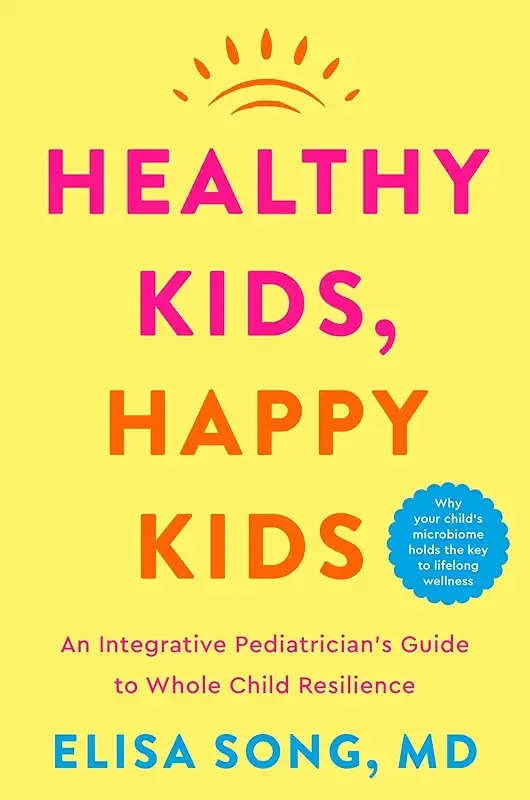We interviewed integrative pediatrician Elisa Song MD, author of Healthy Kids, Happy Kids, about how to have a resilient child. You can watch the replay below. Please note that you will be asked to provide your email address at the 30-minute mark to continue viewing the replay.
What Is a Resilient Child?
Although resilience is often thought of in psychological terms as the ability to bounce back from stressors, newer medical research (see Sources & References, below) is coming to understand that there are biomedical underpinnings about having a resilient child. Clearly, a child who has a chronic health condition will likely have a much harder time being resilient, even from a psychological perspective. Because the gut, brain and immune system are intertwined, it’s helpful to know that making diet and lifestyle choices for your child can increase his or her resilience.
In This Webinar
In this webinar, Dr. Song helped us to understand the changes and practices that parents can make to increase their child’s resilience by answering the following questions:
- Why does resilience start in the gut?
- Why is the gut microbiome the most important biomarker for resilience and optimal health?
- Are there certain dietary changes parents can make to optimize their child’s gut health?
- Can improving gut health lower inflammation?
- Can physical activity improve resilience?
- What are some stress-management techniques for increasing resilience?
- Are there any other things a parent can do to improve their child’s resilience?
Key Discussions
These main themes underscore the importance of diet, holistic health practices, and functional medicine in fostering resilience and overall well-being in children.
Impact of Diet on Gut Health and Longevity
Diet significantly shapes the gut microbiome, which in turn affects overall health and longevity. Consuming a variety of 30 or more different plant foods per week leads to a healthier gut microbiome. Conversely, ultra-processed foods can disrupt the gut microbiome quickly, but healthier foods can begin to heal it within 48 hours.
Managing Health Conditions Through Diet and Lifestyle
Holistic and functional approaches to diet, such as the ketogenic diet for neurological issues or dietary changes like eliminating dairy for ear infections, can improve children’s health. Incorporating natural remedies, addressing food sensitivities, and maintaining a diverse diet rich in plants, nuts, seeds, and fibers are crucial steps.
Role of the Vagus Nerve in Stress Management and Overall Health
Engaging the vagus nerve through techniques like breathing and mindfulness can shift the body from a fight-or-flight response to a state conducive to healing and recovery. Regular practice of vagus nerve stimulation has numerous benefits, including reducing chronic inflammation and balancing physiological processes.
Nutritional Deficiencies and Picky Eaters
Addressing nutritional deficiencies in children, such as zinc, magnesium, vitamin D, iron, and omega-3 fatty acids, is essential for their overall health. Parents can overcome challenges with picky eaters or children with sensory issues by integrating nutrient-dense foods and supplements into their diet creatively.
Holistic and Integrative Approaches to Pediatric Health
Building a strong foundation for children’s health by nurturing the gut microbiome and addressing holistic factors like sleep, hydration, movement, and stress management can lead to more resilient and healthier children. Functional and integrative medicine principles focus on root-cause resolution rather than symptom management.
The American Gut Project
Studies have indicated that the accumulation of multiple stressors significantly impacts children’s health. One compelling piece of evidence comes from the American Gut Project, which studied the effect of diet on the microbiome. Findings showed that individuals consuming 30 or more different plant foods per week had a healthier gut microbiome, indicating a lower total load from diet-related stressors. Conversely, diets high in ultra-processed foods—which can negatively shift the microbiome in just a few days—represent a significant stressor that contributes to the total load.
Non-Celiac Gluten Sensitivity
Research led by Dr. Alessio Fasano has brought non-celiac gluten sensitivity to light. In addition, in his work with children with MIS-C (Multisystem Inflammatory Syndrome in Children). His research suggested that MIS-C is driven by a zonulin-dependent loss of the gut mucosal barrier. Zonulin is a biomarker of intestinal permeability (leaky gut). His team showed that “in children with MIS-C, a prolonged presence of SARS-CoV-2 in the GI tract led to the release of zonulin.”
Heart-Rate Variability
Heart rate variability (HRV) is a reliable marker of vagus nerve health because it directly reflects the influence of the vagus nerve on the heart. A high HRV indicates good vagal tone, suggesting efficient parasympathetic function and an enhanced ability to handle stress and recover from it. We discussed different ways to measure and improve HRV in this webinar.
Timestamped Overview
00:00 Chose holistic medicine over law to help children.
07:26 Book combines holistic health research for pediatricians.
15:37 Optimize children’s gut microbiomes for long-term health.
18:42 Parents can optimize child’s gut microbiome anytime.
22:54 Book outlines steps to support children’s gut health.
27:47 Nurturing child’s microbiome like nurturing environment.
34:46 Encourage kids to add plants to meals.
41:14 Maintain ketogenic state, consult dietitian, incorporate plants.
46:13 Parenting challenges and addressing nutritional deficiencies explained.
52:00 Nourish microbiome for health and happiness.
57:33 Unsweetened oat milk may contain added sugars.
01:03:29 Ear infections often don’t need antibiotics initially.
01:07:16 Homeopathic remedies for ear infections and hearing loss.
01:14:01 Ear curette for gentle wax removal method.
01:20:37 Understanding vagus nerve improves lifelong wellness.
01:22:05 Breathe with your diaphragm for stress relief.
01:28:53 Stimulating vagus nerve aids in healing.
01:36:03 TinyHeatlh uses advanced technology for comprehensive microbiome testing.
01:39:13 Patient’s parents express gratitude for ongoing care.
Resources Mentioned in This Webinar
Healthy Kids, Happy Kids: An Integrative Pediatrician’s Guide to Whole Child Resilience
Fat, Stressed, and Sick: MSG, Processed Food, and America’s Health Crisis
Webinar replay: A Holistic Approach to Ear, Nose and Throat Infections with Tony Ebel DC
About Elisa Song MD
Elisa Song MD is a Stanford-, NYU-, UCSF-trained integrative pediatrician, pediatric functional-medicine expert, and mom to two thriving children, and she is on a mission to revolutionize the future of children’s health. Dr. Song is the author of the national bestseller Healthy Kids, Happy Kids: An Integrative Pediatrician’s Guide to Whole Child Resilience. She will be the keynote speaker at the 2024 Documenting Hope Conference.
Dr. Song created Healthy Kids Happy Kids (www.healthykidshappykids.com) as an online holistic pediatric resource to help practitioners and parents bridge the gap between conventional and integrative pediatrics with an evidence-based, pediatrician-backed, mom-approved approach.

In her integrative pediatric practice, she’s helped 1000’s of kids get to the root causes of their health concerns and empowered parents to help their children thrive by integrating conventional pediatrics with functional medicine, homeopathy, acupuncture, herbal medicine, and essential oils.
Dr. Song is chair of A4M’s pediatric education and has lectured around the world at leading integrative and functional-medicine conferences and premier parenting events. She has also been featured in hundreds of top podcasts, print and online media outlets, including the Wellness Mama podcast, BloomTV, Forbes, Healthline, MindBodyGreen, National Geographic, PopSugar, Parents, Motherly, Parade, Verywell Health, and the New York Post.
Disclaimer
This webinar is not a substitute for medical advice, treatment, diagnosis, or consultation with a medical professional. It is intended for general informational purposes only and should not be relied on to make determinations related to treatment of a medical condition. Documenting Hope has not verified and does not guaranty the accuracy of the information provided in this webinar.
Still Looking for Answers?
Visit the Documenting Hope Practitioner Directory to find a practitioner near you.
Join us inside our online membership community for parents, Healing Together, where you’ll find even more healing resources, expert guidance, and a community to support you every step of your child’s healing journey.
Sources & References
Ahuja, S.K., et al. Immune resilience despite inflammatory stress promotes longevity and favorable health outcomes including resistance to infection. Nat Commun. 2023 Jun 13;14(1):3286.
Bonaccio, M., et al. Mediterranean-type diet is associated with higher psychological resilience in a general adult population: findings from the Moli-sani study. Eur J Clin Nutr. 2018 Jan;72(1):154-160.
Burrows, T., et al. Effectiveness of dietary interventions in mental health treatment: A rapid review of reviews. Nutr Diet. 2022 Jul;79(3):279-290.
da Cunha, L.L., et al. Effects of exercise training on inflammatory, neurotrophic and immunological markers and neurotransmitters in people with depression: A systematic review and meta-analysis. J Affect Disord. 2023 Apr 1:326:73-82.
Dantzer, R., et al. Resilience and immunity. Brain Behav Immun. 2018 Nov:74:28-42.
Dinan, T.G., et al. The Microbiome-Gut-Brain Axis in Health and Disease. Gastroenterol Clin North Am. 2017 Mar;46(1):77-89.
Dogra, S.K., et al. Gut Microbiota Resilience: Definition, Link to Health and Strategies for Intervention. Front Microbiol. 2020 Sep 15:11:572921.
Grossman, P., et al. Mindfulness-based stress reduction and health benefits. A meta-analysis. J Psychosom Res. 2004 Jul;57(1):35-43.
Hantsoo, L., et al. Childhood adversity impact on gut microbiota and inflammatory response to stress during pregnancy. Brain Behav Immun. 2019 Jan:75:240-250.
Jacka, F.N., et al. A randomised controlled trial of dietary improvement for adults with major depression (the 'SMILES' trial). BMC Med. 2017 Jan 30;15(1):23.
Leipold, B., et al. Physical activity and nutrition in relation to resilience: a cross-sectional study. Sci Rep. 2024 Jan 27;14(1):2272.
Manigault, A.W., et al. Psychosocial Resilience to Inflammation-Associated Depression: A Prospective Study of Breast-Cancer Survivors. Psychol Sci. 2022 Aug;33(8):1328-1339.
McDonald, D., et al. American Gut: an Open Platform for Citizen Science Microbiome Research. mSystems. 2018 May 15;3(3):e00031-18.
Relman, D.A. The human microbiome: ecosystem resilience and health. Nutr Rev. 2012 Aug;70 Suppl 1(Suppl 1):S2-9.
Voigt, R.M., et al. The intestinal microbiota: determinants of resiliency? Lancet Healthy Longev. 2021 Jan;2(1):e2-e3.
Wastyk, H.C., et al. Gut-microbiota-targeted diets modulate human immune status. Cell. 2021 Aug 5;184(16):4137-4153.e14.
Whatnall, M.C., et al. Are Psychological Distress and Resilience Associated with Dietary Intake Among Australian University Students? Int J Environ Res Public Health. 2019 Oct 24;16(21):4099.
Yin, Z., et al. Dietary Diversity Was Positively Associated with Psychological Resilience among Elders: A Population-Based Study. Nutrients. 2019 Mar 18;11(3):650.
Resources
Books
Reid, Katherine, et al. Fat, Stressed, and Sick: MSG, Processed Food, and America’s Health Crisis. Rowman & Littlefield Publishers, 2023.
Song, Elisa. Healthy Kids, Happy Kids: An Integrative Pediatrician’s Guide to Whole Child Resilience. Harvest, 2024.




